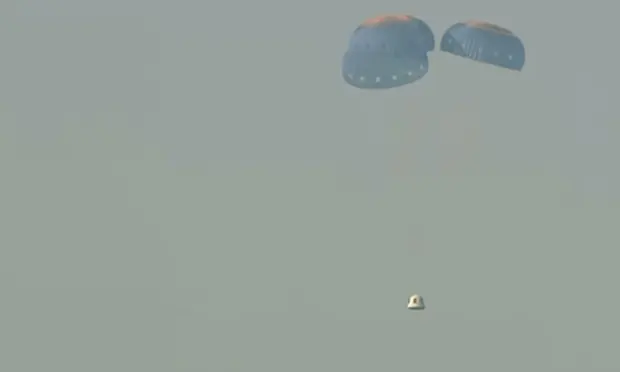An uncrewed rocket belonging to Blue Origin, failed shortly after launch in Texas on Monday morning, a potential setback for the Amazon founder’s wider ambitions of sending humans into orbit.
The malfunction of the New Shepard booster, a type of rocket that is similar to the one Blue Origin has used this year to send three crews of up to six people on suborbital flights, came 1min 4sec after launch and just as the vehicle was reaching its maximum dynamic pressure.
A built-in abort system jettisoned the crew capsule away from the booster at about 8.8km altitude and deployed parachutes that dropped it back to earth. The booster is presumed to have been destroyed.
“It appears we’ve experienced an anomaly with today’s flight – this was unplanned and we do not have any details yet, but our crew capsule was able to escape successfully”
“You can see how our backup safety systems kicked in today to keep our payload safe during an off-nominal situation. Safety is our highest value at Blue Origin. It’s why we built so much redundancy into the system.”
Erika Wagner senior director at Blue Origin, said during the livestream
A subsequent tweet from the company said: “This was a payload mission with no astronauts on board. The capsule escape system functioned as designed.”
The mission, called NS-23, was carrying “36 payloads from academia, research institutions and students across the globe” on this particular vehicle’s ninth overall flight, Blue Origin said.
The company believes two additional experiments attached to the exterior of the booster to analyze the effects of ambient exposure to the space environment were destroyed.
In six crewed “tourist” flights lasting between 10 and 15 minutes each, Blue Origin has taken 31 humans to space on New Shepard launches, most recently last month. Previous passengers have included Bezos in July 2021 and the Star Trek actor William Shatner three months later.
Although today’s flight employed a different booster and capsule than those carrying humans, Blue Origin’s schedule is likely to face delays as engineers attempt to identify and correct the malfunction’s cause.
Blue Origin has more ambitious plans in addition to its tourism flights, including its New Glenn project for orbital flights scheduled for a first test flight next year & developing a human ready moon lander in partnership with Nasa.
Nasa’s own plans for returning to the moon have suffered their own setbacks in recent weeks, with two separate attempts to launch the first test flight of its Artemis 1 rocket called off because of technical problems.






